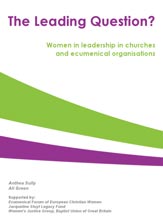Women Church Leaders Tell How It Is - and How It Should Be
Launch of significant new report and recommendations for churches and ecumenical bodies on International Women's Day
Churches of all denominations, together with their ecumenical bodies, have been called to identify ways of pro-actively ensuring the presence of women at the highest levels of decision making.
Carrying out a gender audit of their structures, processes and activities on a regular basis and encouraging and enabling the use of liturgical language that is properly sensitive to gender are among the recommendations of a significant new report launched on International Women’s Day (8 March).
The Leading Question? addresses issues faced by women in leadership and aspiring to leadership, in churches and ecumenical structures. The report will launch at Monmouth Baptist Church today. The work was supported through the Jacqueline Stuyt Legacy, and the Baptist Union of Great Britain (BUGB) Women’s Justice Committee.
It arose from a Women in Leadership Consultation (WLC) that began in 2011, and reflects the direct experience of women in positions of leadership who came together to explore the issues that had confronted them. They reflected theologically together to identify what developments and actions could lead to ways of being and acting that are fully gender inclusive.

Co-author of the report Anthea Sully, a campaigner for change and policy development in human rights, social justice and inclusion, said, ‘The Recommendations of The Leading Question? suggest ways in which the leadership styles of women can be more fully understood and affirmed within the life and structures of church denominations and ecumenical institutions.
‘The hope is for a wider awareness of key concerns and issues identified and experienced by women, and a deeper understanding of actions that need to be taken by churches in order to become truly gender inclusive.’
Members of the WLC consultation came from different church confessions, bringing a wide diversity of leadership experience, in churches, in ecumenical structures as well as in the secular workplace and politics. They included the Revd Dr Myra Blyth, chaplain and fellow at Regent’s Park College Oxford, and former deputy general secretary of the Baptist Union of Great Britain, Loretta Minghella, director of Christian Aid, and the Revd Roberta Rominger, general secretary of the United Reformed Church.
Recommendations of The Leading Question?
As a result of the findings and conclusions of the work of the ‘Women and Leadership Consultation’, churches of all denominations, together with ecumenical bodies, are called to take the following actions:
1. To commit to carry out a gender audit of their structures, processes and activities on a regular basis
If awareness of the potential and possibilities of gender equality in leadership is to be recognised, the continuing failure to involve women needs to be named and recognised. A regular audit allows this to be done.
2. To encourage and enable the use of liturgical language that is properly sensitive to gender.
Language is a crucial issue – especially the language used in worship and how we speak of God. We believe there is no reason why our language cannot be inclusive, so ensuring that all know they belong within the worshipping community.
3. To identify ways of pro-actively ensuring the presence of women at the highest levels of decision making.
This could take several forms. It might involve quotas on committees and governance bodies; it could mean bringing women into chairing, facilitating and leadership roles that are not dependent on conventional church hierarchies; it might lead to models of co-leadership involving both women and men. However it is done, it is vital that the voices of women are heard.
4. To develop mentoring schemes for women.
It is clear from the stories heard and told that women need support and encouragement in order to take on leadership responsibilities. But there are women with experience of leadership who can provide this, offering the possibility of mentoring schemes.
5. To ensure that there are opportunities for women’s stories to be heard in ways that model effectively the strong link between worship and action.
Women have particular experiences of injustice – including abuse, poverty, violence and intolerance – together with understandings of how to respond. These need to be recognised and heard.
6. To seek out Christian women in leadership positions in secular organisations and ensure that there are opportunities for such experience to influence and challenge church structures.
Issues of gender and leadership are not confined to the church. The church can learn from secular organisations, and this should be actively encouraged.
7. To ensure that there is a framework in place whereby women who experience harassment, bullying and abuse are able to safely disclose and receive protection through suitable processes.
The consultation uncovered many examples of such behaviour. There is a need to have clear and safe processes in place that can be accessed whenever necessary.